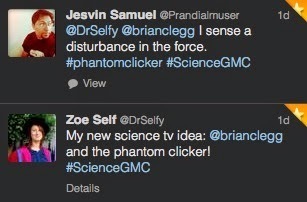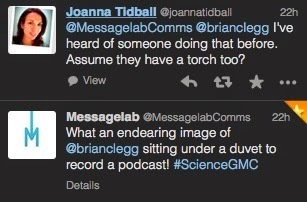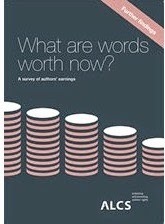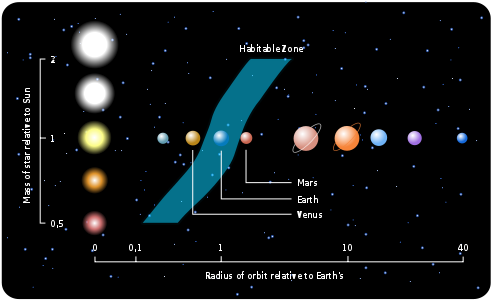Brian Clegg's Blog, page 73
April 30, 2015
A bright burner
 When I read about them in my youth, there seemed something magical in the description of the acetylene or carbide lamps that were used on early motor vehicles. The idea that adding water to the lamp started a process that could generate a flame seemed wonderfully counter-intuitive.
When I read about them in my youth, there seemed something magical in the description of the acetylene or carbide lamps that were used on early motor vehicles. The idea that adding water to the lamp started a process that could generate a flame seemed wonderfully counter-intuitive.But acetylene, the unusually triple bonded inflammable organic compound that was generated by a reaction between water and calcium carbide is more than just a flash in the lamp. Find out more about this zippy little molecule, in my latest Royal Society of Chemistry podcast. Take a listen by clicking to pop over to its page on the RSC site.
Published on April 30, 2015 00:37
April 29, 2015
Fed up of tribalism in politics
 There is much wailing, moaning and gnashing of teeth* on the ineffectual nature of politics and politicians in the current general election, with the newer thrusting parties like the SNP, the Greens and UKIP (there's an unholy alliance) blaming the old guard and the Westminster elite.
There is much wailing, moaning and gnashing of teeth* on the ineffectual nature of politics and politicians in the current general election, with the newer thrusting parties like the SNP, the Greens and UKIP (there's an unholy alliance) blaming the old guard and the Westminster elite.Actually, I'd suggest that most of the problems with politics are caused by tribalism, and nowhere is tribalism stronger than amongst the likes of the SNP, the Greens and UKIP. They aren't the solution, they are even more dramatically more of the same.
I suggest it's time to redesign parliamentary democracy for the 21st century. After all, we don't do medicine the way they did back when Parliament was establish - why should the democratic processes stay the same in an internet interconnected world?
Here's a few suggestions:
MPs become solely local representatives. Their full time role is helping their constituents.As well as a local MP, we vote for policies, which have to be fully independently costed before the election (it may be better for there to be a rolling set of policies with 'NHS week, defence week, education week etc. to avoid overload)Each policy has a champion who is not an MP but an expert in the area, whose role after a policy is adopted is to manage it into practice using the civil service.Of course there is a lot of detail you could moan about. For instance:How would you balance the economy if people could vote for any old policy? Clearly you couldn't expect it just to happen by osmosis. There would have to be a balancing mechanism where you could only change policy to one that costed more if other changes enabled funding to be released.But what if people voted for a policy that is bad? Erm, this is democracy. The most contentious issue is with things like the death penalty and ring-fencing the aid budget, where the 'elite' generally has a different view to the larger populous. The line between democracy and mob rule is an interesting one. I'm really not sure about this one, as I'm with the elite on both those examples, but I don't think it highlights a problem with my suggestion, but rather a problem with democracy as a concept.And there will be lots of other picky details. Well, of course. This is a fuzzy handwaving idea, not a proper proposal. You wouldn't expect to sort out politics in half an hour. But I still think that this is the kind of radical re-think we need. Anything else is just tinkering.
* I can't type 'gnashing of teeth' without retelling the old Ian Paisley joke.
Paisley is preach hellfire and damnation and tells his audience that when the sinners among them go to hell there will be a wailing and a gnashing of teeth.
'I'm sorry, Mr Paisley,' says an elderly lady from the audience. 'But I have no teeth.'
'Teeth,' responds Paisley firmly, 'will be provided.'
Published on April 29, 2015 02:10
April 28, 2015
Enlightening the International Year of Light
 It seems that 2015 is the International Year of Light. And to be honest, I'm all in favour of it. Not just because one of my favourite books,
Light Years
is out in a new edition this year*, but also because I can't think of a better topic to show how science can be essential, fun and fascinating.
It seems that 2015 is the International Year of Light. And to be honest, I'm all in favour of it. Not just because one of my favourite books,
Light Years
is out in a new edition this year*, but also because I can't think of a better topic to show how science can be essential, fun and fascinating.Let's face it, we wouldn't have much of a life without light. In fact we wouldn't exist. Nor would anything else. It's not just a matter of not being able to see. Light also provides us with the energy to live. Apart from nuclear power, tidal power from the Moon and geothermal energy, light is responsible for all the energetic input to our lives. It's light from the Sun that keeps the Earth at temperatures that support life, and light from the Sun that powers the weather system.
More fundamentally at a quantum level, photons of light are the carriers of the electromagnetic force. No light, no electromagnetism. And that doesn't just mean no electricity and magnets. It's electromagnetism that enables us to interact with matter. It's electromagnetism that stops you falling through the floor - and that is the reason that the floor exist at all. Without photons - light - atoms wouldn't exist. So it's pretty important stuff.
I've far to little space to cover everything that's fascinating about light (you'd need a whole book... ahem) but a few pointers:
Light can travel faster than light – in the strange world of quantum mechanical tunnelling, photons carrying the signal of Mozart’s 40th symphony have travelled at over four times the speed of light.We could soon be computing with light – electricity just isn’t flexible enough to keep up as computers get quicker and quicker. Soon the insides of a computer could be full of a spider-web network of light as data slams back and forth through thin air.You can’t run away from a laser – If you were to travel at 99 per cent of the speed of light away from someone shooting you with a laser, the light would still come towards you at the full 299,792,458 metres per second. Unlike anything else, however fast you move away from or towards light, it still comes at you at the same speed.The human eye can see a candle flame 10 miles away – your eye is remarkably sensitive, needing only a five or six of the individual photons that make up a light beam to trigger a response. The most distant thing most of us can see with the naked eye is the Andromeda galaxy, 2.5 million light years away.Ordinary colour vision works using the three primary colours. Night vision is quite different, registering only brightness. But there is a cutover period (called mesopic vision) when both types of vision occur together. It’s as if there was a whole new colour added to the spectrum that hadn’t existed before. Sight at this dusky light level has strange qualities – perhaps why so many ghosts and other phenomena are seen at dusk.Algae rules – more light energy from the sun is absorbed by photosynthesis by tiny algae in the sea than by all the plants on the land.Special materials have been used to slow down light to walking pace or even bring it to a temporary halt.Our eyes are incredibly flexible – light on a sunny day is 100 times brighter than a typical office, but our eyes balance out the difference. Full moonlight, which we can see quite well by, is around 300,000 times weaker than sunlight.A waterspout inspired fibre optics – the fibre optics that carry most of our telephone and computer signals on beams of light were inspired by noticing that light followed a spout of water, gushing out of a hole in a tank.So if you felt any urge to snigger when you read it was International Year of Light, don't. If anything deserves its own year, light does. And that's why I'm so fond of Light Years.

* This is the third edition, and for the first time I've been allowed to include as an appendix, as I always planned, a set of original documents from the history of understanding of light, including Newton's letter on light and colour.
Published on April 28, 2015 01:48
April 27, 2015
Doing the science communication thing
 The Guardian's rather wavy HQ and home of the MasterclassOn Saturday I had a great time up at Grauniad Towers, curating a Science Communication Masterclass. (Sorry, I hate that 'curating' word in this context, but it's what the G people call it.)
The Guardian's rather wavy HQ and home of the MasterclassOn Saturday I had a great time up at Grauniad Towers, curating a Science Communication Masterclass. (Sorry, I hate that 'curating' word in this context, but it's what the G people call it.)Marcus Chown, Angela Saini, Jenny Rohn and I covered science for magazines and newspapers, TV and radio, books and blogs with a really responsive and interesting audience of 50+ people.
It was a full day event, so it would be over the top even to give a summary, but a few snippety takeaways:
From Marcus: an article (for newspapers particularly) should be like a fractal. You should be able to take, for example, the first part of it and it should still give you look a bit like the whole. From Angela: getting into broadcast media is a bit like getting into Fort Knox. Have a showreel. Oh, and don't put a lot of effort into smartening up the sound quality of a recording: the BBC can do it much better and quicker than you can.From Jenny: if you use pictures of your lab, make sure there are no caged animals or containers labelled 'dangerous genetically modified organism' in the background. Funny, but a serious point behind it. A picture may be worth a thousand words, but those words can be highly misleading if not carefully taken.From me: check out the mouse if slides keep moving on themselves, and record podcasts under a duvet.Just a quick explanation of my two lessons. During my talk, the slides kept backing up of their own accord. I first thought that I was accidentally pressing a button on the 'clicker' but it kept happening even when I put it down. What I discovered afterwards was that the presenter's desk had a slide-in shelf with the keyboard and mouse on it. The mouse was trapped between the shelf and the desktop, so every time I brushed against the shelf it pressed a button on the mouse. Spooky!

The duvet bit caused much amusement, but I genuinely was given this advice by a professional broadcaster/recordist. If you want a studio ambiance in your home, going under a duvet produces a suitable 'flat' soundscape. It does really work, though you feel a bit of a twit.

And no, I don't use a torch, I read my script from an iPad*.
*Other glow in the dark tablets are available.
Published on April 27, 2015 00:58
April 24, 2015
Writers and social media
 The RLFI am off this evening to sunny Bristol, where I'll be on a panel for the Royal Literary Fund, discussing the topic Social Media for Writers: Brave New World or Circle of Hell? If you are in the Bristol area and of a literary bent, please do come along and join us. It's free and starts at 7.30pm - the location is Waterside 2, The Watershed, 1 Canons Road, Harbourside, Bristol BS1 5TX.
The RLFI am off this evening to sunny Bristol, where I'll be on a panel for the Royal Literary Fund, discussing the topic Social Media for Writers: Brave New World or Circle of Hell? If you are in the Bristol area and of a literary bent, please do come along and join us. It's free and starts at 7.30pm - the location is Waterside 2, The Watershed, 1 Canons Road, Harbourside, Bristol BS1 5TX.If you aren't able to join us, just a few passing thoughts.
 A platformFor quite a while now publishers have been very excited about writers (particularly book authors) having a 'platform'.
A platformFor quite a while now publishers have been very excited about writers (particularly book authors) having a 'platform'.This does not mean that you should rush out and buy a train set (though feel free to do so, should you wish), but rather that you should have a mechanism for making yourself visible to as many potential readers as possible.
You might think that a publisher's website does this. After all, every book should be listed there, and they usually have some kind of author profile. Here, for instance, is mine for St Martin's Press, my main US publisher:

To be fair, it does also include a twitter feed and links to my books. But really... not only is it rather outdated, who looks at a publisher website (other than authors)? As a buyer you might go to a bookshop website, or an author's website - but it's pretty unlikely you'd even known which publisher to look at, let alone visit their site.
Given those two visit points, it's a good idea to have an author page on Amazon (here's mine) and a website (ditto) - but even these will need some first contact to encourage someone to go to them. And that's where the social media side can help.
What I can say for certain is that mentioning a new book on Twitter or Facebook or whatever won't sell lots of copies. It may well sell a handful, but don't expect floods of sales. But if you plug at social media over a reasonably lengthy period (we're talking years, not weeks), you can build up a network of contacts who will be interested in your work.
There are lots of hints and tips for doing this, but I think two are key:Don't be always selling. No one likes 'Buy, buy, buy' all the time. (Or for that matter, 'Here's my breakfast' or 'Aren't my kids amazing?') I reckon at least 90% of your output should be funny observational material or stuff that's interesting for your target market.Remember it's a conversation. Don't just broadcast, respond to others, particularly when they reply to you. The idea is to build a relationship, however stunted by the technology.It's not really possible to quantify the benefit as an author from being accessible via social media (and I'd include blogging like this as well as part of a social media platform). But if you do it right it doesn't need to take up a huge proportion of your time, potential readers will be more interested in your work, and you will benefit from the contributions of others. What's not to love?
Published on April 24, 2015 01:29
April 23, 2015
Mechanical computation
 Digi-Comp I (photo from Wikipedia)It's of the nature of coincidences (that's another post) that your attention is drawn to something when it comes up several times in a short time span, and recently for me this has happened with the matter of mechanical computers, which have come up four times in the past couple of weeks.
Digi-Comp I (photo from Wikipedia)It's of the nature of coincidences (that's another post) that your attention is drawn to something when it comes up several times in a short time span, and recently for me this has happened with the matter of mechanical computers, which have come up four times in the past couple of weeks.The first example was when I was proof reading my next title for St Martin's Press (not due out until significantly later in the year), called Ten Billion Tomorrows . The book about the relationship between science and science fiction, and I point out that when I saw 2001: A Space Odyssey in the cinema, the only computer I had ever seen before I encountered the remarkable Hal was my Digi-Comp I. This was a mechanical device with three plastic sliders, which could be programmed by adding extensions on the side of the sliders which flipped metal wires, and as a result could provide the action of different gates and reflect the outcome on 3 mechanical binary displays. Sophisticated it was not.
Examples two and three involve good old Charles Babbage. You just can't talk about mechanical computers without mentioning Babbage. He first came up in my review of James Tagg's Are the Androids Dreaming Yet , which confuses an image of the Science Machine's Difference Engine with the Analytical Engine. (The first was a hard-geared mechanical calculator, while the second, never built, was a programmable computer that would have used punched cards. Babbage built a small segment of the Difference Engine, but never got anywhere with the Analytical Engine, which probably would not have been practical given engineering tolerances.)
Then Babbage popped up again in a Guardian article about a graphic novel featuring the Analytical Engine. As Thony Christie points out in a blog post, the article wildly overstated the contribution of Ada King* to the project saying that 'Ada Lovelace and Charles Babbage designed a computer' and 'for which Lovelace wrote the programs.' In fact King had nothing to do with the design, she translated a paper on the concept from the Italian and added a series of notes, which included a example of what a program might be like. We have no evidence that she wrote this conceptual program herself, and even if she did it didn't make her the machine's programmer.
The claim that King wrote programs comes up again in Matt Parker's entertaining Things to Make and Do in the Fourth Dimension, which I'm currently reading for review. But of more interest is his description of building a working computer (admittedly only capable of adding up to 16) with 10,000 dominos by using the interaction of falling dominos to produce gates. This was a wonderful feat for which this tireless maths enthusiast should be congratulated. You can see the 10,000 domino computer in action below.
* I prefer Ada King to the more commonly used Ada Lovelace, though I admit I seem to be about the only one who does. Her full name was Ada King, Countess of Lovelace. While in principle a countess can be referred to by her title in place of surname, the usual reporting standard is to use the surname. So, for instance, when referring to the Duke of Bedford, he is called Andrew Russell, not Andrew Bedford. People sometimes get confused because the royals don't really have surnames, so there's no other choice with them. But I think with Ada it's primarily done because 'Lovelace' sounds more exotic.
Published on April 23, 2015 01:07
April 22, 2015
It is time other governments met their responsibilities
 For me, the only TV news worth watching in the UK is Channel 4 News, with its real depth of analysis, general lack of dumbing down and occasional playfulness. However, if they have one fault it is that they still think that Britain runs an Empire and, as a result, responsible for all the world's ills.
For me, the only TV news worth watching in the UK is Channel 4 News, with its real depth of analysis, general lack of dumbing down and occasional playfulness. However, if they have one fault it is that they still think that Britain runs an Empire and, as a result, responsible for all the world's ills.This struck me on their recent exposé of the way that migrant agricultural workers in Spain were struggling in terrible conditions, poorly paid, with dangerous exposure to pesticide. It was an important piece of reporting for me, but what seemed crazy was the way that the vast majority of the emphasis was on the responsibility of the British supermarkets who were among the (many) EU buyers of the salads from this region.
Spain is part of the EU and subject to all the European legislation on working conditions. The obvious culprits here were the Spanish companies producing the salads and the Spanish politicians who don't crack down on this. But, no, over and over again the blame went on our rapacious supermarkets. They even had a Spanish politician pushing the blame our way.
Just imagine if the situation was reversed and C4 News was reporting on farms in East Anglia which supplied several EU countries. Would they be blaming French supermarkets for their maltreatment of workers? Of course not. They sensibly would be blaming the companies, the regulators and the government in the UK for not intervening. It really was bizarrely biassed.
I don't deny that supermarkets have some pretty unpleasant trading attitudes, squeezing all they can out of their suppliers - British milk producers can tell you all about that - but I've negotiated plenty of business to business contracts, both as a buyer, trying to reduce prices, and as a seller, trying to get as much as possible. You don't agree to a ridiculous price and as a result mistreat your workforce. You walk away.
However, this still misses the point. Whatever the supermarkets are doing, it is the Spanish companies and the Spanish authorities that must take the blame here, and it's a shame C4 News was too old fashioned, with its apologetic taint-of-Empire attitude, and too inward looking to realise this.
Published on April 22, 2015 01:26
April 21, 2015
Writing: not get rich quick
 The Authors' Licensing and Collecting Society, a lovely organization which you need to sign up to if you are a UK-based writer, as they collect money from copying etc. for you, has published more detail from a study they did last year on authors' earnings. (If you feel like you're having deja vu, they published preliminary results last year.) They surveyed 2,454 writers, a mix of 'professionals' and spare timers.
The Authors' Licensing and Collecting Society, a lovely organization which you need to sign up to if you are a UK-based writer, as they collect money from copying etc. for you, has published more detail from a study they did last year on authors' earnings. (If you feel like you're having deja vu, they published preliminary results last year.) They surveyed 2,454 writers, a mix of 'professionals' and spare timers.When I tell people I'm an author, some assume that this can be equated with being rich, as the only authors they ever see are the bestsellers. What they ought to think is that it's a bit like someone saying 'I'm in a band' - the chances are that they play down the pub every fourth Friday, rather than packing out the O2.
The survey really brings home how far authors are from being rich. The median* income for a professional authors (someone who spends more than 50 per cent of their working time on freelance writing) is around £11,000. That's well below a living wage. Where in 2005, 40 per cent of professional authors earned a living solely from writing, now it's just 11.5 per cent. To quote the report:
A handful of highly successful authors make a very good living; for the majority, earnings from writing fall well below subsistence level.Of course there are those high earners. The top 5 per cent bring in £100,000 a year or more - and between them account for 42.3 per cent of the total earnings. (This is why a median is more valuable than a mean**, as the vast majority of authors earn well below the mean, which was £28,577.)
There was an interesting division by genre (this is for all writers, where the overall median earning is just £4,000). The academics come out worst with a median of just £1,000 (but they do all have a day job), while audio-visual writers came out best with a median of £14,000, followed by children's fiction writers on £10,000. Us poor non-fiction types come in at £5,206.
Authors shouldn't expect huge advances either (this is the amount paid by the publisher before the book earns anything). Both the number of authors getting an advance at all has dropped and 44 per cent said their advances have dropped in the past five years - though we aren't told what happened to the rest.
One last interesting observation - only 17 per cent of those surveyed were under 45, while 54 per cent were between 45 and 64. However this may just reflect who was more likely to fill in the survey.
As always, the stats interest me and I need to give the ALCS a rap over the knuckles for saying that they surveyed 2,454 writers. What actually happened is that 2,454 started the survey, which was a 7 per cent response rate, but only 1,477 people actually finished it, and so not all of the data is based on that bigger number. Incidentally I was one of those didn't complete it, as the survey was immensely long - 65 questions.
There is also some fuzziness over what is meant by 'author'. The report repeatedly refers to this being about authors, but when you look at the breakdown of respondents, only 40 per cent identified themselves as authors, with the only other big heading being 'academic'. Only 5.3 per cent called themselves journalists. So they are sort of authors. The majority of respondents were people who earned more from books than other sources of writing, so that 'author' label is probably justified.
You can find the full report here.
* median is the middle value if you put all the earnings in a row in order
** mean is the average value found by adding up all the earnings and dividing by the number of people
Published on April 21, 2015 01:58
April 20, 2015
What is a representative audience sample?
 Poll of polls from BBC websiteOne of the reasons I wrote
Dice World
is that I love probability and statistics, so it was fun to see a stats row in the news.
Poll of polls from BBC websiteOne of the reasons I wrote
Dice World
is that I love probability and statistics, so it was fun to see a stats row in the news.Ukip has been kicking up a fuss over the makeup of the audience in the opposition leaders' debate last week. They say that the BBC (or, to be precise, ICM, who assembled the audience for the BBC) were biassed in favour of left-wing parties, producing the clearly overwhelming anti-Farage sentiment in the audience.
Here is what I've seen reported as the makeup ICM used: about 58 Conservative/ Ukip, 102 for Labour, the Lib Dems, SNP or Plaid Cymru, all arguably parties of the left. And 40 undecided. (This was from a fairly dodgy source, so if anyone can confirm, or has better numbers, please let me know.)
So if we ignore the undecided, that's 36 per cent who have said they will vote in a way that might make them relatively positive to Farage.
So the question is, how can you be representative? There are two significantly different interpretations of what 'representative' means in this context. One is to take the last election, the only true nationwide poll we have, as a starting point, and the other is to take a sample poll as organizations like ICM generally do.
If they had gone for the 2010 election, the Conservatives had 47 per cent of the seats (Ukip, of course, had none) - which sounds a lot more that their representation here, but that just reflects the oddities of the first past the post voting system. If you go on the only relevant figure, the percentage of votes cast, they had 36 per cent of the vote - which means that the proportion was perfect.
So how about asking people now? Based on the latest poll of polls (see above), the Conservatives have around 34 per cent of the vote, which might again make the numbers seem reasonable, were it not for the rise of Ukip. They currently stand at 12 per cent in the poll of polls, so the combined Conservative/Ukip percentage on this basis should have been 46 per cent: on this measure they were under-represented.
There is inevitably some room for subjective choice. Personally speaking, I think the votes from the last generation election (i.e. 36 per cent) is the best starting point. This is because we know general election polling is often well adrift of sampled polls, so these numbers provide the only truly reliable poll, but we do need to bear in mind that it is five years old - and that means it show the position before the rise of Ukip.
However, it would seem odd for ICM to use these figures, as the BBC wouldn't need to bring them in to use the popular vote from the last election. They could do what I did and look up the numbers. So ICM must have (and did) use a poll to decide the proportions, and in those circumstances, it does seem that Ukip has a reasonable claim that the makeup of the audience was non reflective of the UK at large. Here's ICM's explanation of what they did:
A total of 30 small geographical areas (Super Output Areas, as defined by the Office for National Statistics) were selected within a 20-mile radius of the venue. A minimum of 8 people were recruited within each area, in line with both demographic quota variables that reflected the composition of the UK population by gender, age, ethnicity, and social grade, and political protocols that reflected the balance as agreed between the broadcasters and the political parties. One fifth of the total number recruited was on the basis of being a self-defined 'undecided voter'. Separately, a small number of SNP and Plaid Cymru supporters were recruited in Scotland and Wales, using alternative recruitment strategies, reasonably decided upon by ICM. [my italics]So, in fact, the audience was not representative of the country at all, but just of the location the debate took place, meaning that all bets were off.
Lies, damned lies and statistics, eh?
Published on April 20, 2015 01:47
April 17, 2015
No, this won't tell us how life evolved on Earth
Probably the worst aspect of science journalism is the way that editors feel the need to have world-shattering headlines. New Scientist is one of the worst for the this. Time after time you see something really exciting on the cover like 'Black holes don't exist!', then when you read the actual article it delivers nothing of the kind, telling you that someone has a disputed theory that in some circumstance black holes may not form. In a way it's the grown-up version of what I was moaning about the Daily Excess doing yesterday.
So I was a bit wary when I saw the Observer headine Scientists hope Venus will give up the secret of how life evolved on Earth . And rightly so. What we got was an interesting article about Venus and how we might discover why Venus, a similar size to Earth and also 'well within the Goldilock zone' is so different from Earth (and so inhospitable to life).
In the end, the analysis came down to 'Venus may have had a water/carbon dioxide like the early Earth, but being closer to the Sun, the water could have been driven off - no water, no life.'

I have a couple of problems with this. One is whether Venus really is in the Goldilocks zone. See the image above from Penn State University, which clearly puts it outside. But also it's hardly telling us 'how life evolved on Earth' to say that a planet that has water is more likely to have life than a planet that doesn't. It's not news.
If you really want to find out more about the way life probably evolved on Earth you need a book like The Vital Question (though it is more modest in its claims, only saying 'why is life the way it is') not a study of Venus.
In case there's any doubt, I'm not criticising the original article - it has some good material on Venus and what may have caused it to be different to Earth (apart from my slight dispute over the Goldilocks zone), but putting an overblown title on it leads to disappointment. Science articles should do what they say on the tin.
So I was a bit wary when I saw the Observer headine Scientists hope Venus will give up the secret of how life evolved on Earth . And rightly so. What we got was an interesting article about Venus and how we might discover why Venus, a similar size to Earth and also 'well within the Goldilock zone' is so different from Earth (and so inhospitable to life).
In the end, the analysis came down to 'Venus may have had a water/carbon dioxide like the early Earth, but being closer to the Sun, the water could have been driven off - no water, no life.'

I have a couple of problems with this. One is whether Venus really is in the Goldilocks zone. See the image above from Penn State University, which clearly puts it outside. But also it's hardly telling us 'how life evolved on Earth' to say that a planet that has water is more likely to have life than a planet that doesn't. It's not news.
If you really want to find out more about the way life probably evolved on Earth you need a book like The Vital Question (though it is more modest in its claims, only saying 'why is life the way it is') not a study of Venus.
In case there's any doubt, I'm not criticising the original article - it has some good material on Venus and what may have caused it to be different to Earth (apart from my slight dispute over the Goldilocks zone), but putting an overblown title on it leads to disappointment. Science articles should do what they say on the tin.
Published on April 17, 2015 02:41



